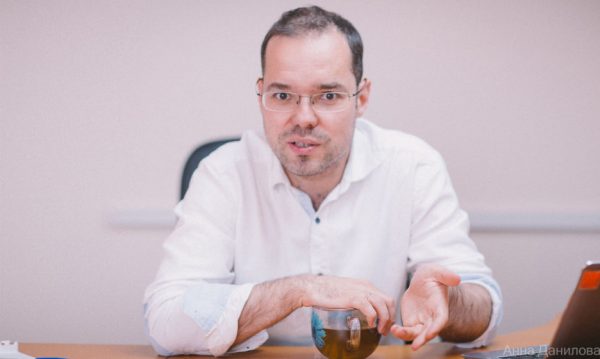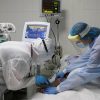Why isn’t there enough drugs and why do pharmaceutical companies leave the market?
 “Cancer treatment is free in Russia. But to buy an expensive drug, people are forced to sell their apartments”, – says Mikhail Laskov, an oncologist. He told Pravmir about the theft of cancer drugs, pharmaceutical companies leaving Russian market, and how the pandemic affected the treatment of cancer patients.
“Cancer treatment is free in Russia. But to buy an expensive drug, people are forced to sell their apartments”, – says Mikhail Laskov, an oncologist. He told Pravmir about the theft of cancer drugs, pharmaceutical companies leaving Russian market, and how the pandemic affected the treatment of cancer patients.
— Now everyone is discussing the cancer drug theft scandal. How did cancer doctors react to this?
— Unfortunately, there is nothing new in this story. This is happening not only in St. Petersburg. This happened not so long ago in Moscow. And this also happened a year ago. The problem is that only the middle link was caught, and this global system of stealing cancer drugs has much higher responsible people.
The medicine in our country is provided by the government. Patients should receive cancer drugs for free. Yet, people sell apartments to buy drugs that should be given out for free. How does this happen? Because somebody does not get what they are supposed to get, right?
— But there is an opinion that doctors are not to blame…
— It does not matter who is to blame, it is a solely technical matter. It could be the doctors who are to blame. We do not know that, there was no trial. It could be a delivery man, it could be chief physician, or someone else: it does not matter at all. We need to understand a root cause.
What is the root cause? There is a large unmet demand for cancer drugs, which people must get for free based on the Constitution, state guarantees and so on. It is like with the deficit in the Soviet Union: there was a demand for what was missing, that is why there were speculators.
The government declares that it treats everyone for free, but in fact, there are not enough medications for everyone. It means, there is a demand. It means that such dark schemes exist. Some people want to steal, others want to sell. Some people will be put in prison, others will take their place. For there is a large number of people who cannot get medicine for free. But they want to live, they will buy it whatever it takes.
These stolen drugs are sold to city hospitals, they win tenders. Because criminals can sell them cheaper. The chief physician that buys them may understand that they cannot cost this little. However, firstly, it is profitable for the hospital because it is cheaper. Secondly, they simply cannot buy more expensive drugs by law. It is difficult to blame them for this if cheaper suppliers enter these tenders. Thirdly, they cannot do anything about it. They are not the police.
— What is the extent of this? How long has this problem been around?
— This has been happening for years. As soon as targeted expensive drugs appeared, this started happening.
There are many schemes. Those who are prescribed with drugs cannot get them with prescription. Doctors prescribe a different dose, but the rest of drugs get stolen… The fact that this story has existed for years does not mean that nobody knows about it, but that people think that it is normal.
The root of the evil is that we supposedly have free cancer drugs for everyone. This is not the case at all. Therefore, people will steal and sell drugs to those who do not have enough of them.
Why do people steal and resell drugs when they are free for everyone? If they said, “Guys, we were thinking. There is no money, and it is normal. There will not be these medications. Or we will subsidize them, but not pay for them in full. For example, we will pay for 50%, and you will pay for other 50%”. It would be more honest. They promise everything, but this does not really happen.
They caught criminals that stole cancer drugs in St. Petersburg, which is great. And someone said, “Thank you, the market is ours”. People have stolen cancer drugs before and will continue to do that.
Why are there not enough free cancer drugs?
— Why are there not enough drugs for patients?
— The problem is complex, as usual. There is insufficient funding, bureaucracy, drugs are purchased late, and officials do not know how to work. There is phase-out of imports, pharmaceutical companies are leaving the market.
— Why do they leave?
— Some companies left the market due to problems with the drug labeling system. Many companies left before that because the maximum selling prices were formed in such a way that it was impossible to do business. And the law on public procurement is designed so that you can only buy the cheapest goods, which means that they are not always of high quality.
For reference. MedacGmbH (Germany) has withdrawn cancer drugs Medac from the Russian market; Takeda Pharmaceuticals, a Japanese company, has stopped supplying three drugs: Amitriptyline Nykomed, Metronidazole Nykomed, and Atenolol Nykomed. An international company Servier no longer sells the anti-cancer drug Mustoforan in Russia.
Our courts do not protect patent holders. Drugs that are under patent protection get registered in Russia. We looked at India, they do that there, and we decided to do the same.
— Are we talking about compulsory licensing?
— When a third-party pharmaceutical company starts producing a generic/ biosimilar drug, although it is still under a patent protection, compulsory licensing is possible. This is a rule that exists in the World Customs Organization (WCO).
Yet, when does this happen? If a force majeure occurs and a franchiser refuses to sell a vital drug to another country for some exceptional reason. For example, war.
However, it happens here not because of force majeure, but because someone really wants to make easy money. There are already several cases in courts.
— What medications has this already happened to?
— I read the information about Lenalidomide for multiple myeloma treatment. Our Russian court agreed that Nativa can produce it despite the fact that the American company Celgene has a patent for this drug. And our government buys this Lenalidomide for 7-9 billion rubles a year.
Cancer patients will not be able to go to other regions for treatment
— What is the current situation with the availability of cancer drugs?
— They continue to disappear for the same set of reasons that we discussed. In general, in terms of sabotage in oncology, 2020 surpassed absolutely all other years.
Firstly, the maximum number of drugs disappeared. Secondly, a new healthcare procedure is being discussed. According to it, people with cancer cannot choose where to be treated, they will be able to undergo treatment only there, where regional officials allow them to. If this procedure is approved, it will be the worst thing that would have happened to oncology in recent years.
— This is an order of the Ministry of Health on a new procedure for providing cancer care. Has it been officially published yet?
— The order has been publicly discussed. It caused not so much noise and discontent. It was removed, it has been posted again now, and there are zero changes regarding the assignment of people to medical institutions. In general, of course, it will be a disaster if everything stays like this. Patients will not be able to choose a clinic for themselves.
— But it is illegal. A patient has the right to choose where to be treated.
— This was apparently done to fully control money flow of the regional compulsory health insurance (CHI) funds. Because it is inconvenient if a person from one region is treated in another region. A region loses money that it should get as per the CHI system.
Officials should administer budget money in the interests of people. I think, they confused themselves with someone else, they decided that the money was theirs after the money got into the CHI budget. No one can remind them that this is not the case at all. Now we need to attract as much attention as possible to this sabotage.
— How should the cancer patient routing be organized?
— People should have the opportunity to go to the doctors they want to see if their clinics operate in the CHI system. If you think that a doctor, about whom you read on the Internet and asked others for recommendations, suits you, but the doctor is in Vladimir, and there is not a specialist you need in Moscow, you will go to Vladimir and money under CHI will go together with you.
What will happen as a result? One hospital will be full, the other will be empty. This is called competition. An empty hospital will have to compete for patients. To train doctors, to invest in the equipment.
The patient’s choice should increase the quality of the oncological treatment. If they are not able to make that choice, what kind of quality improvement can we talk about?
— The order applies only to adults.
— I would like to remind you that, in general, children’s oncology is a drop in the bucket compared to adult oncology. I worked in both branches, and everyone wants to live the same, both children and adults.
— You said that a lot of drugs have disappeared this year. Was it the pandemic that affected this?
— The crisis does not bring anything new, it only accelerates the destructive processes that existed before. And vice versa, it activates the positive processes that also existed before.
The massive destruction that our medical authorities produce has been catalyzed and is developing at a triple rate.
Unfortunately, the desire to control and manage other people’s money has increased catastrophically.
— Do doctors talk about it?
— Now, they started to shut people’s mouths: this is the next step. They started to shut people’s mouths on two sides. Firstly, through the order of the Ministry of Health so that doctors could not speak out. Secondly, through actions of the Investigative Committee. I know two doctors who were called to the Investigative Committee because of publications in the press. I think, it is highly likely that it will also happen to me after this publication, because this has started not so long ago, it has been happening for about two months. They are verifying if a crime has been committed. This is a Russian version of fake news. Now, a statement is a crime.
— Did the Investigative Committee become interested in your colleagues after their statements about COVID-19?
— Yes, these were the statements about COVID-19, but the legislation does not say anywhere that COVID-19 is the only topic for fake news. It is clear that they pay most attention to COVID-19.
Positive changes
— Private services are included in CHI. Can a patient undergo treatment in a private clinic with their insurance policy if the state ones are not available?
— Private clinics are now in difficult circumstances, not all of them can work under CHI. Sometimes they simply do not get paid. I know of cases of criminal prosecution.
For example, the case with the Harmony clinic. They treated people under CHI for a long time, then it turned out that there were criminal cases against the clinic managers. They were accused of treating dead souls. I am not a judge, I cannot say that they did not treat dead souls. But I know for sure that a lot of people got very good therapy for free thanks to the clinic.
— Is there anything positive going on in medical cancer care at all?
— What does a patient need? A patient needs three things: to live as long as possible and to recover if possible; secondly, to have fewer complications; thirdly, to have it easy – for the treatment to remain available, fast, and, if possible, with the maximum preservation of the usual life.
There has been a positive change in recent years: both state and private clinics have invested in equipment. I am not just talking about Moscow. If it was impossible to see transcripts from a region with CT and MRI equipment earlier, ten years ago, now this diagnostic equipment is available in a clinic. The question is of what quality?
Positron emission tomography (PET/CT) scan has become available. It is prescribed whenever necessary and unnecessary: the latter happens more often. New linear accelerators have become available. We used to have terrible Soviet machines. Some private clinics started to treat people under CHI. This is very good.
— What is happening now in cancer care that is not yet available to us?
— The most important thing is not yet available to us: a reasonable approach to the organization of cancer care. There is equipment, and there will also be drugs if the market is not destroyed. Do you know the story about programmers? A wolf destroys a house, which piglets build faster than a wolf destroys it. Our wolf is faster. Piglets are trying to restore the market.
How did the pandemic affect the availability of treatment?
— If we talk about COVID-19 and cancer, there were concerns that the number of cancer deaths during the pandemic would increase due to difficulties in getting cancer treatment. Is there any statistics?
— I do not have the data to show that the mortality rate is increasing. It is too early to draw such conclusions. The situation will become obvious in six months or a year. There will be precise foreign and our own statistics.
But I see that many people, my patients that come to me, cannot receive cancer care in a timely manner.
— Are they not getting hospitalized?
— They are not hospitalized, queues are increasing and so does the examination time. A person has lung cancer, they want to do a CT scan, but they have to wait a very long time. And now this applies not only to free medicine, but to the entire system. A person wants to do it for money, but there is no place to do it, because everyone does a lung CT scan when they think they have COVID-19. Private clinics also have queues.
Yes, medical care is becoming less available: this is what I see in individual stories. Now, due to the second wave, the situation will become worse. People cannot do tests or get hospitalized on time, and the waiting time for an outpatient consultation increases.
— Is there any data on how COVID-19 affects the course of cancer?
— Yes, of course, COVID-19 is an additional risk for cancer patients. If you have COVID-19 and you need to do chemotherapy, for example… it is better for COVID-19 to run its course first.
— For which types of cancer is this combination most dangerous?
— Naturally, for those types that affect the respiratory system. For those people who go through intensive chemotherapy, which itself can cause pneumonia and weaken the immunity system.
— How has the pandemic affected the oncology in the world and its treatment methods? There was already time to make some new decisions about routine treatment procedures. What has changed in the world and what has changed in our country?
— We had a military department at our institute, and no one knew what it was for. They were taught there how to sort patients. Theoretically speaking, they roll out their regimental aid station and the first thing they do there is triage: this person seems to be dead, this one seems to be alive, but will die; this person is alive but seriously injured, they still have a chance and will be treated; this one is lightly wounded: “go and rest”. This medical triage has become a part of life in the whole world now.
That is, sometimes it followed a tough scenario of Italy in March, when “we will not hospitalize the elderly, they will die anyway”. This was a horror that no one expected to witness in civilized Europe.
In general, for example, all the methodological recommendations in oncology now are supplemented by some kind of sorting of people by how quickly a certain intervention needs to be performed. For example, they do not operate on some mildly aggressive prostate cancer, which would have been inspected and operated on earlier. They say, “There is COVID-19 now. There are risks”.
If an elderly person comes with concomitant diseases, they are told, “You will definitely not die from cancer now, but if you get COVID-19 in the hospital, your death is guaranteed, so we are postponing the operation”. This did not happen before: we postpone the operation for this person, that person does not need to be observed after the treatment… Elements of military medical triage are now part of the routine treatment practice, and not only for cancer.
— Do you know many doctors who got infected?
— I know many. Some of them died. For example, Grigory Fedoruk, you wrote about this on Pravmir. He was an excellent orthopedic surgeon; we were friends for many years. Yes, there are doctors, who have died, that I knew personally.
Translated by Julia Frolova

















